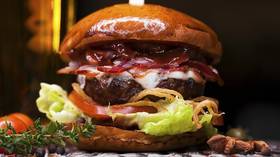Is nothing sacred? For WaPo, hamburgers have ‘hidden Russia connection’

There is no food so quintessentially American as hamburgers, which of course makes them a perfect target for disparagement by the woke clickbait media. The newest twist is that they have a ‘hidden Russia connection.’
“Even one of Trump’s favorite foods has a hidden Russia connection”: That is how the Washington Post Magazine chose to spin its most recent article about the humble ground meat patty sandwich, which delves into the history of the Soviet cousin of hamburgers. More on that in a minute, however.
From the Magazine: Even one of Trump’s favorite foods has a hidden Russia connection https://t.co/cDHpenCxvn
— The Washington Post (@washingtonpost) July 31, 2019
The Post tweet about the story was widely seen as being in bad taste, with a ratio of 1,300 replies to 250 retweets and likes combined, within two hours of being posted.
Most of the replies mocked the paper for continuing to beat the “Russiagate” horse that has already been clobbered to death – if not by the report of special counsel Robert Mueller, then by his congressional testimony last week. The Post's reporting on the subject has already earned the paper widespread scorn.
Also on rt.com No, YOU are ‘Russian asset’: Meme war turns tables on Washington PostThe article itself, written by Deena Prichep, a Portland-based journalist and co-author of a Russian cookbook, brings up the story of how Anastas Mikoyan, the Soviet food minister, visited the US in 1936 and brought home the machines for making hamburgers, which quickly became popular in the Soviet Union as “Mikoyan cutlets.”
Though the original patties produced by Mikoyan’s machines were identical to their American cousins, it didn’t take them long to evolve into something distinct. They incorporated bread crumbs like a meatloaf, and were served on a plate – not in a bun – and eaten with a knife and fork. Even their shape changed from round to elongated, with tapered ends.
There is no evidence that the current US president ever encountered a Mikoyan cutlet. He is, however, very fond of the good old American hamburgers – or “hamberders,” as he once notably misspelled it.
Also on rt.com Trump pays for fast food served to national football champs at White House, blames shutdownBack in January, during the government shutdown over a wall funding standoff with Democrats, Trump invited the college football champions, the Clemson Tigers, to the White House and served them over 1,000 burgers from major fast-food chains, noting that he paid for them out of pocket.
That might have been enough for the Post, desperately hungering for hate-clicks, to commission a story about the hamburger's secret and sordid “Russian ties” to complement their ever-expanding body of ‘Trump-Russia’ articles.
Other forces could be at play, too. Earlier this month, both the Post and the New York Times ran stories disparaging the US space program as too “white and male,” right on the 50th anniversary of the Apollo 11 Moon landing. If even that stellar achievement was not safe from woke scorn, why would hamburgers be a sacred cow?
Also on rt.com Attacks on ‘white & male’ Moon landing prove no US achievement is too big for liberals to destroyWhile the exact origins of the hamburger are a mystery, the beef patties sandwiched in buns exploded in popularity across the US after the 1904 World's Fair in St. Louis. The consensus is that they were named after the German city of Hamburg – and probably derived from the German dish called “frikadelle,” a flattened and larger version of meatballs popular in Scandinavia.
Believe it or not, “woke” attacks on the hamburger’s American character actually predate Trump. In April 2015, months before he announced his presidential bid, HuffPo ran a story claiming that hamburgers actually originated over 2,000 years ago in China! The outlet argued that Chinese street food known as rou jia mo – chopped meat inside a bun, around since the Qin dynasty – is the “world’s first hamburger.”
HuffPo was actually trying to popularize the Chinese “burger,” but a lot has changed since then. Now, mainstream media outlets are nagging Americans to eat less meat in the name of “climate change,” offering as alternatives “plant-based” substitutes, soy and even maggots (no, really), putting the humble hamburger on the chopping block.
By Nebojsa Malic
Nebojsa Malic is a Serbian-American journalist and political commentator, working at RT since 2015
Think your friends would be interested? Share this story!












